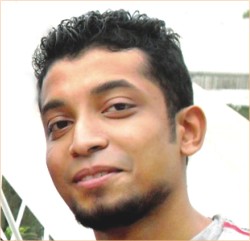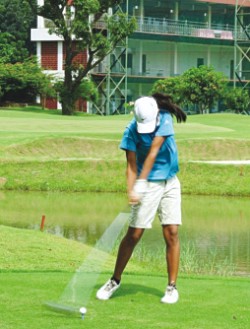
Wasfia Nazreen
Female Mountaineer

From peak to peak, Wasfia Nazreen has made a great name for Bangladesh. She reached the top of Aconcagua, the highest mountain on Earth outside the Himalayas, the summit of South America, on 16th December 2011, Bangladesh's 40th Victory day.
Previously, she also reached the top of Kilimanjaro, summit of Africa, on 2nd October of the same year already two of the seven mountain tops she had planned to wave Bangladesh's flag on. Earlier in July 2011, she attempted the summit of Europe, Mount Elbrus, from the notorious North side when the 'normal route' through the South was shut due to political commotion. Unfortunately, she had to call off the ascent 300 meters from the top due to a number of circumstances.
She launched these particular expeditions under the campaign “Bangladesh on Seven Summits” in celebration of Bangladesh turning 40. Wasfia's goal has been to climb the highest point of every continent with a personal ground of saluting women's advancement over the last four decades in Bangladesh. Her initiative so far has been made possible by her own savings, contributions by friends and by the altruistic motion of selling-off all her materialistic belongings. The campaign is logistically supported by the Liberation War Museum.
Wasfia, along with some friends have also formed a foundation by the same name aiming to educate and train women/adolescent girls with scholarship in wilderness sports and outdoor activities, which she feels is “mandatory for one's well-being.” Super excited about the school, she looks forward to bringing forth a mind-life-spirit curriculum with the help of renowned international outdoors personalities. She hopes that this foundation, the first of its kind, could serve as a small hub for women of South-East Asia.
A rights activist, outspoken writer and a development practitioner, Wasfia walked on various high and low lands of Bangladesh and abroad, before embarking on her mountaineering career. Claiming herself as a “homeless” individual, she says that this identity is perhaps her root inspiration in working for those whose home spaces are threatened or those who don't have one. Whether for refugees, better livelihoods of sex-workers or voicing the plight of the indigenous people, Wasfia has been very attached in her social work for a decade and doesn't consider her shift in climbing mountains as a switch from one to another. It is simply one of her many passions.
Naturally, growing up in Chittagong had something to do with her love for mountains, even if she calls them only hills. “Trekking and mountain lifestyle inspires me because it gives me the sense of beauty, stillness, simplicity and challenge that is very hard to obtain all at the same time through other activities...watching the sunrise and sunset from the high camps are, hands down, the most beautiful memories of my life.”
In 2012, she spot-marks Everest in April, summit of Asia, which itself is a two and a half months long expedition, and then in summer she hopes to make her way to Denali, summit of North America and in October to Carstensz Pyramid, Summit of Oceania.
When asked about how Bangladesh can go forward in this industry, she expressed sadness on the politics and divisions that goes on between the existing “trekking/climbing” groups in Bangladesh. “It's time to throw off the egos and instead help each other reach the top as fellow country people.” She also hoped that the Government would come forward to recognize this lifestyle.
As she hops around continental summits of the globe, physical and emotional motivations asides, she feels this whole experience is about learning to survive with the right intent, integrity and respect towards what nature has to offer. "As with anything, I think it's crucial to double-check one's motivation to be a trekker/climber first. It's really not just about reaching the summit. Mountains are the few places where one can observe the curvature of Earth while being on it at the same time… things fall into perspectives with such sacred experiences…but we have to approach it from a place of peace, honesty and togetherness. Not with competition."
by Shayera Moula
Majed Ul Huq
President of Underground Football Association (UFA)
 For someone who does not have a clue about the underground football scene, Majed Ul Huq is a typical university graduate just starting off his career, dabbing the bass and passionate about football. For the ones who spend most of their free afternoons on shoddy football pitches around Dhaka, Majed is known as “Mr. UFA”. 24-year-old Majed majored in marketing and finance from North South University and served at Radio Foorti, but when asked about his true goal in life, Majed poured his heart out about how his initiative five years ago structured something so well-known to football lovers in Dhaka.
For someone who does not have a clue about the underground football scene, Majed Ul Huq is a typical university graduate just starting off his career, dabbing the bass and passionate about football. For the ones who spend most of their free afternoons on shoddy football pitches around Dhaka, Majed is known as “Mr. UFA”. 24-year-old Majed majored in marketing and finance from North South University and served at Radio Foorti, but when asked about his true goal in life, Majed poured his heart out about how his initiative five years ago structured something so well-known to football lovers in Dhaka.
“Around 2003, I was in a school tournament with just 4 teams. It was a disorganised mess so I decided to take things into my own hands. My friend Daiyan Alamgir and I had a plan to gather passionate football fans so during the 2006 world cup, we had an online forum," says Majed. "It was very successful with lots of intellectual discussions and banter. From there we started picking out people who were interested in playing 5-a-sides. We started playing small tournaments to really understand how we could get the most out of this.”
Majed's small experiment saw the first tournament under UFA's banner take place in July of 2006 and since then, more than fifty competitions have been held, courtesy of all the budding footballers who love a challenge. Teams like 7 Nation Army are just as well known to the young generation of Bangladesh as Real Madrid.
Talking about his favourite teams Majed related, “Alan Shearer is my hero. I am an avid lover of Newcastle United and at the international level I'm a die hard Argentina fan.”
Majed's biggest challenge in organising tournaments is finding the right people to assist him. “It's hard to find passionate football fans who can uphold the responsibility of management. Also, the football pitches in Dhaka are not in the best of states. But we have no other options so we cope.” When asked about what he gets out of this, Majed says, “There is no other satisfaction greater than working for something you truly love. The fact that my efforts are helping the underground football scene to flourish and let amateur football players have a base is more than enough reward”.
by Aarony Zade
Nikita Sarker
Female Golfer in Bangladesh
 Most people in Bangladesh are likely to agree that there aren't girls in Bangladesh who play golf. Well, there are, and Nikita Sarker is one such promising golfer.
Most people in Bangladesh are likely to agree that there aren't girls in Bangladesh who play golf. Well, there are, and Nikita Sarker is one such promising golfer.
"For as long as I can remember, my father was delighted if he could take me to the golf course with him to practice in the range. But like many others, I found golf to be rather monotonous and unpopular, so I did not have much interest in the sport," she says. So when asked what actually got her interested, she explains her sporting background at school. She played for her school football team. She says, "So whenever we lost, it would dishearten me that although I gave my complete effort, if the whole team performed badly, I would also bear the defeat." Golf is a sport where the credit goes individually to the player along with the blames for the mistakes. She says that the independence is what she enjoyed at golf.
To add to that, she soon learned that she was the only junior girl competing against all the other boys her age. The unique foothold she had at Kurmitola Golf Club is what initially kept her motivated, but it was not long before she understood that she had the talent to improve further, her first coach being the nation's pride, Siddikur Rahman. Nikita won her first trophy at the age of eleven, and has not looked back since.
At the age of thirteen, she was asked by the club to compete in the ladies category as she had already excelled in the juniors and she almost immediately started to win there as well.
Today, at the age of 18, with a handicap of 13, she is the first girl to have represented Bangladesh overseas as part of the Bangladesh National Team in countries like Thailand, Nepal, Pakistan and India. She also won the Sri Lankan Amateurs in 2009. 'The Junior British Open held in Scotland was the best," she says, "I got to meet people from 73 countries, players far better than I am, but it is the experience that I've brought back home with me that matters the most."
She participated in the Junior British Open for two consecutive years and it gave her the opportunity to meet golf icons like Phil Mickelson, Adam Scott, and even Tiger Woods. "For a golfer, coming from a country like Bangladesh, with such few opportunities, that is the most I could have asked for," she concludes.
Nikita is clearly proud of her achievements, having received over forty trophies till date, but when asked what is it that she enjoys the most about golf, she says, "I enjoy how I get to alter a lot of people's perspectives every day. I meet people at home and abroad who are totally surprised to learn that Bangladeshi girls play golf and are surprisingly good at it." She informs us that sponsors like Gemcon Group and the R&A (Scotland) have stepped up to provide underprivileged girls (mainly daughters of the caddies in the golf club) with training and equipment.
"I have understood and explored a different side of patriotism when I marched down the streets in Thailand holding the Bangladesh national flag with the national anthem being played by a brass band. I felt a particular sense of pride in being a woman and being able to outshine in such a male-dominated field. Kurmitola Golf Club is like a home to me, and the people there are like my own family, as I grew up with them. Golf keeps me content and peaceful. It is my personal form of ecstasy."
Compiled by Star Correspondent